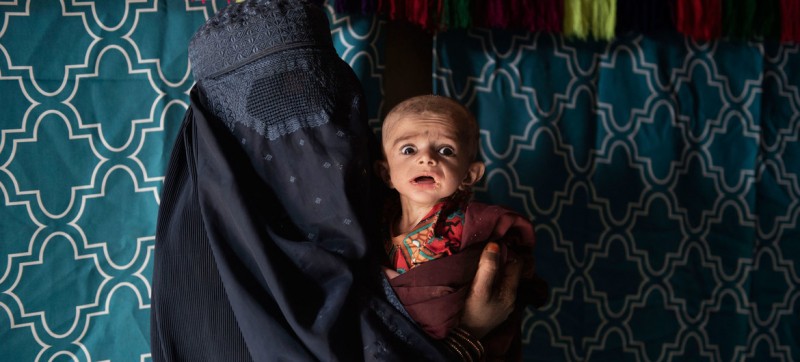Mother brings her severely malnourished 7-month-old baby to a mobile health and nutrition team in a village at Maiwand District of Kandahar province, Afghanistan. Amidst “truly unprecedented levels” of hunger in Afghanistan, the UN refugee agency (UNHCR) said on Friday that as winter arrives, avoiding widespread starvation “is an immediate priority”. Launching a global fundraising winter campaign to help forcibly displaced families in Afghanistan and elsewhere to cope with the most life-threatening months of the year, UNHCR Spokesperson Babar Baloch described it as “a crisis of hunger and starvation”. “People don’t have enough to eat, and it’s very visible”.
As winter bites in Afghanistans, UNHCR is appealing for much more support amid acute and rising humanitarian needs for 3.5 million people displaced by conflict inside the country – including 700,000 who were displaced in 2021. https://t.co/E7583J0Ymp @refugees
— UNHCR News (@RefugeesMedia) December 3, 2021
Displaced lack proper shelter
Following his recent return from Kabul, Mr. Baloch said in Geneva that a lack of insulated shelters, warm clothes, insufficient food, fuel for heating, and medical supplies are just some of the deprivations confronting people who have been forcibly displaced.
With temperatures “expected to drop to -25C, many displaced families lack proper shelter – a primary requirement if they are to survive the bitter cold”, he warned.
3.5 million in need
UNHCR is appealing for increased support for 3.5 million people displaced by conflict inside Afghanistan, including 700,000 from 2021 alone.
According to Mr. Baloch, nearly 23 million people, or 55 per cent of the population, are facing extreme levels of hunger – nearly nine million of whom are at risk of famine.
This year, UNHCR has assisted some 700,000 displaced people across the country, the majority since mid-August.
The UN agency is helping nearly 60,000 people every week.
“But as we reach thousands of people, we find thousands more people who are in need of humanitarian assistance”, Mr. Baloch explained, before appealing for “further resources for the most vulnerable”.
He identified “single mothers with no shelter or food for their children”, displaced older persons left to care for orphaned grandchildren, and people taking care of loved ones with special needs.
Appeal for more support over winter
The UNHCR spokesperson noted that the agency’s teams have delivered relief supplies via road through Afghanistan’s neighbouring countries and humanitarian flights.
Five more flights carrying winter supplies are scheduled for next week, Mr. Baloch said, reiterating that support to cope with the extreme conditions will continue until February, including core relief items, such as thermal blankets and warm winter clothing.
Shelters are also being repaired and reinforced, and vulnerable families are receiving cash assistance.
Mr. Baloch thanked Government and private donors for their support to UNHCR efforts to aid and protect vulnerable families during the winter months.
However, he added that a further $374.9 million was urgently needed to bolster UNHCR’s response to Afghanistan next year, particularly, over winter.




Comments are closed.